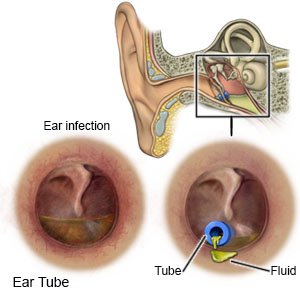Myringotomy with PE Tubes in Children
Medically reviewed by Drugs.com. Last updated on Apr 6, 2025.
What do I need to know about myringotomy with PE tubes?
Myringotomy is surgery to put a hole through your child's eardrum. The hole relieves pressure and lets fluid drain from your child's ear. A pressure equalizing (PE) tube will be put through the hole during surgery. The tube is used to keep the hole open and to help drain fluid. Over time, the tube will fall out or be removed by a healthcare provider.
 |
How do I prepare my child for surgery?
- Your child's surgeon will tell you how to prepare your child. He or she may tell you not to let your child eat or drink anything after midnight on the day of surgery.
- Tell your child's surgeon about all medicines your child currently takes. The surgeon will tell you if your child needs to stop any medicine for surgery, and when to stop. He or she will tell you which medicines your child should take or not take on the day of surgery.
- Your child's surgeon may check for other ear, nose, or throat problems. Your child may need to have blood and urine tests and x-rays. He or she may also need hearing tests.
- Your child may be given an antibiotic before surgery to fight infection and decrease ear pain. Anesthesia will be given to prevent pain during surgery. Tell your child's surgeon if he or she had an allergic reaction to antibiotics or anesthesia.
Drugs used to treat this and similar conditions
Ciprodex
Ciprodex (ciprofloxacin and dexamethasone) is used to treat ear infections. Includes Ciprodex side ...
Augmentin
Augmentin is a prescription antibiotic combining amoxicillin and clavulanate to treat bacterial ...
Omvoh
Omvoh is used to treat moderate to severe ulcerative colitis or Crohn's disease in adults. This ...
Azithromycin Dose Pack
Azithromycin Dose Pack is used for babesiosis, bacterial endocarditis prevention, bacterial ...
Amoxil
Amoxil (amoxicillin) is a penicillin antibiotic used to treat many different types of infections ...
Cortisporin-TC
Cortisporin-TC is used for acute otitis externa, chronic otitis media, middle ear infections ...
Ofloxacin otic
Ofloxacin otic is used for acute otitis externa, middle ear infections
Cephalexin
Cephalexin is a cephalosporin antibiotic used to treat bacterial infections like respiratory, skin ...
Azithromycin
Azithromycin is an antibiotic used to treat many different types of infections caused by bacteria ...
What will happen during surgery?
Your child's surgeon may give him or her local anesthesia to numb the ear. Your child may feel pressure or pushing, but he or she should not feel pain. If your child needs to be asleep, he or she will get general anesthesia. Your child's surgeon will make an incision in the eardrum. He or she will drain fluid that is trapped inside the middle ear through this hole. The surgeon will put a small tube into the hole. He or she may also put antibiotic drops into your child's ear.
What should my child expect after surgery?
Your child will be taken to a room to rest. If your child was asleep during surgery, he or she will stay there until fully awake. Do not let your child get out of bed until healthcare providers say it is okay. When healthcare providers see that your child is okay, he or she may be able to go home. Medicines may be given to prevent a bacterial infection or to relieve pain and swelling.
What are the risks of myringotomy with PE tubes?
During surgery, a nerve may be damaged. Damage can decrease your child's ability to taste. After the PE tube is placed, your child may get an infection. He or she may have hearing loss from bleeding or scar tissue. Your child's PE tube may fall out too soon. He or she may need another procedure to put in a new tube. Your child's eardrum may tear from the PE tube. It may not close after the tube is removed. He or she may need surgery to repair the eardrum.
Care Agreement
You have the right to help plan your child's care. Learn about your child's health condition and how it may be treated. Discuss treatment options with your child's healthcare providers to decide what care you want for your child. The above information is an educational aid only. It is not intended as medical advice for individual conditions or treatments. Talk to your doctor, nurse or pharmacist before following any medical regimen to see if it is safe and effective for you.© Copyright Merative 2025 Information is for End User's use only and may not be sold, redistributed or otherwise used for commercial purposes.
Further information
Always consult your healthcare provider to ensure the information displayed on this page applies to your personal circumstances.
